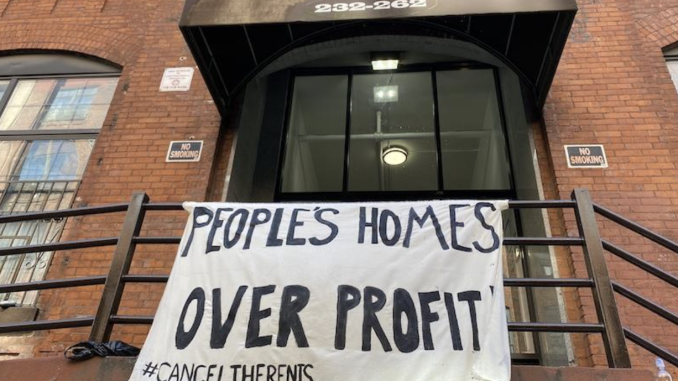
BY TANESHA THORPE
After New York State’s eviction moratorium came to an end, activity in the city’s housing courts had a gasping increase. The court previously handled more eviction cases than any other city in the country.
The Moratorium was enacted as part of the state’s pandemic- relief effort to help tenants who were affected by the COVID-19 Pandemic.
Since March 2022, landlords have filed about 2,000 eviction cases per week, which is about 40% higher than they did in mid-January when the state’s eviction ban expired on the 15th.
According to city records, there have been more than 500 evictions of tenants from residences since February 2022, which is roughly twice as many as there were in the 20 months before that.
Because the DOI updates its record only when a marshal reports an eviction – which can take days or weeks – the actual number of legitimate evictions is probably greater.
“When I got the eviction notice I didn’t know what to do. I was still out of work and struggling to pay bills,” said Angelica Rosario.
She received her eviction notice a few days after the moratorium expired on Jan. 15, 2022.
Evictions in Latinx communities ranked highest compared to Black, White, and Other.
During the pandemic – when both national and local municipalities enacted a moratorium – cases drastically decreased. When compared to the city’s average, evictions in New York City decreased to almost nil during April, May and June, 2020.
“The support was just too good to be true. I know my landlord was just waiting for the moment he could give that notice. But thankfully I was able to find support,” said Rosario.
Jessica Torres lived in her building in Bedford- Stuyvesant for years and says when she got her notice, she went to look for ways the City might have been able to help. She worried that none of the help being provided would be enough to save her apartment, seeing the increased amount of people being let go.
“I got approved after I submitted with ERAP last year, but that only helped but so much. I’m still struggling to pay rent and funds just aren’t there,” said Torres.
She reapplied right before the window closed, but is concerned that the relief fund will run out before they get to her application and she won’t be able to pay her landlord.
New York State implemented support systems like the Emergency Rental Assistance Program (ERAP) providing rental arrears, interim rental assistance, and utility arrears support to low- and moderate-income households at danger of homelessness or housing instability.
Currently, applications are on hold. Any application submitted before Sept. 30, 2022 will be still be reviewed, officials said.
“We’re very busy and continue to get a bunch of calls. Applications were closed due to limited funding and the increased amount of applicants that were being received,” said Ricardo Gutierrez Public Support Operator for ERAP.
Multiple resources that New York State has provided in the past are now closed due to lack of funding. Torres’s fear may soon be many others as well.
“We would love to help everyone, but as we all know that isn’t always possible. There were over 1,000 applications a week at one point,” said Janelle Holmes, Press and Information Assistant for ERAP.
There have been a total of 387,326 applications submitted to the program and of that 213,079 have been paid out.
“There are many different reasons evictions increased, but the main reason we’ve seen is due to the rise in rent and the tenant’s inability to pay that and back rent owed,” said Holmes.
She explained that a lot of tenants who were approved like Torres end up falling back behind on rent, because they still can’t afford to pay.
“Majority of the people that call are individuals who were laid off or jobless and still trying to find something to replace their previous income,” said Holmes. “But we also help connect tenants to information for free legal representation.”
Under New York City’s Right-to-Counsel (RTC) law, DSS’ Office of Civil Justice (OCJ) provides tenants facing eviction in Housing Court or NYCHA administrative proceedings with access to free legal representation and advice provided by legal services organizations from across the five boroughs.
Multiple representatives from ERAP have agreed that based on conversations they’ve had with tenants and current numbers the representation has been a great help.
“This will only last so long, lawyers are overworked and overloaded with cases. The pandemic caused a pause from the historic eviction jump, but it didn’t stop it. Evictions are still predicted to increase, so people should set themselves up the best they can at this time. But we will do all in our reach to help,” said Nathaniel Case, a 311 Right-to-Counsel Operation Representative.
